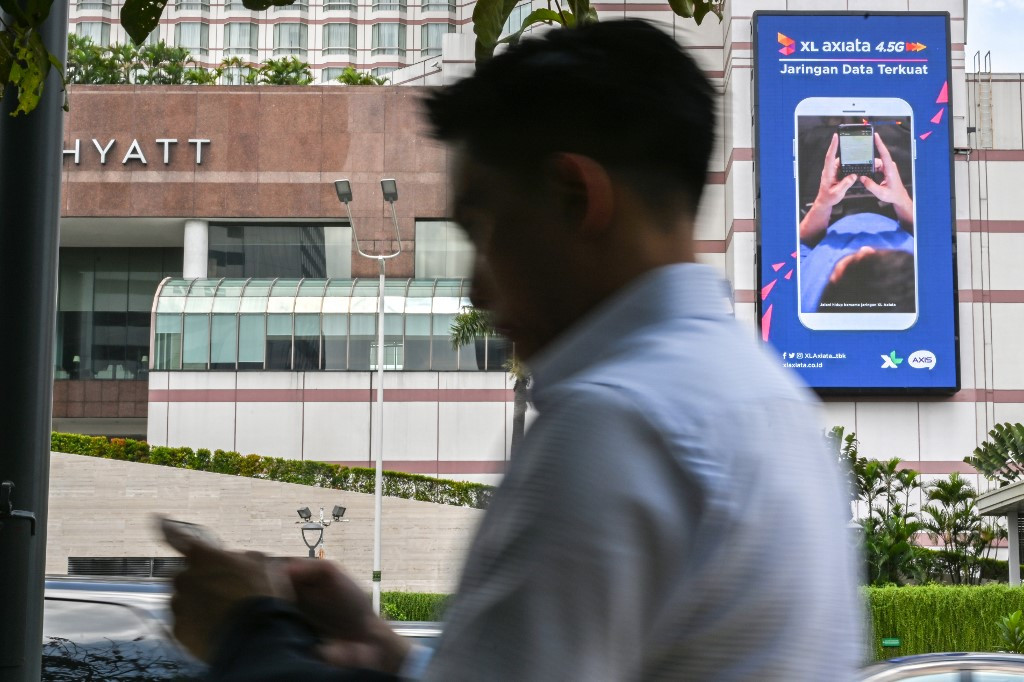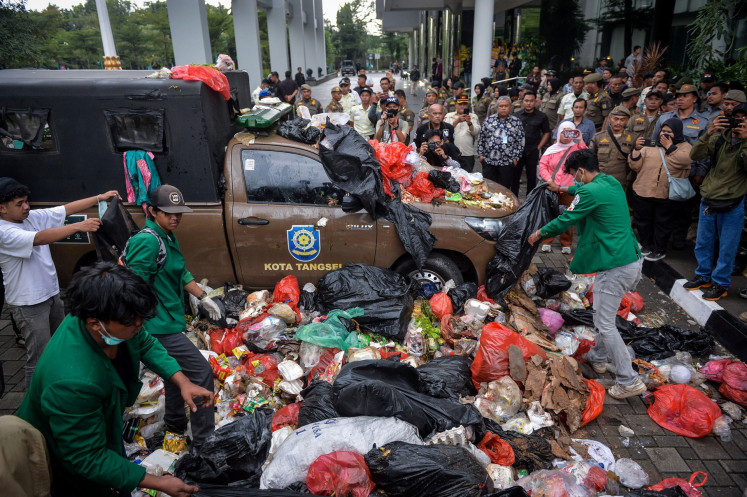Popular Reads
Top Results
Can't find what you're looking for?
View all search resultsPopular Reads
Top Results
Can't find what you're looking for?
View all search resultsBoosting e-commerce under Jokowi's second term
An incoming Jokowi government will need to focus on further development of digital infrastructure to help lift rural connectivity rates. Indonesia lags behind its neighbors on this front, only investing 1.3 percent of its GDP compared to Thailand’s 2.4 percent, Malaysia’s 4.5 percent and Singapore’s 6.6 percent.
Change text size
Gift Premium Articles
to Anyone
N
ow that President Joko “Jokowi” Widodo has secured another five years in the top job, it is likely he will continue to focus significant attention on infrastructure development. It is hoped that this will include more focus on digital infrastructure, so as to bolster e-commerce opportunities as a way to stimulate economic growth. E-commerce is seen as a good way that Indonesia could reach its 2025 target of seven percent annual gross domestic production (GDP) growth. This target is not necessarily a pipe dream as some estimates predict Indonesia could account for 46 percent of Southeast Asia’s e-commerce in value by the middle of next decade.
The growing viability and importance of this sector is reflected by the large investments in Indonesian e-commerce businesses by the big Chinese tech companies such as Alibaba, Tencent and JD.com. Both Tencent and JD.com are investing heavily in the Indonesian ride-sharing start-up and Indonesian e-commerce darling Go-Jek. Go-Jek has also attracted investment from Google, the first direct investment from an American tech company in Indonesia.
Both Go-Jek and Singaporean rival Grab are in a race to become the biggest consumer technology groups in Southeast Asia by expanding first in Indonesia. Further large e-commerce investments by Chinese companies include Alibaba’s US$1.1 billion investment in Indonesia's largest online marketplace Tokopedia, and a $2 billion acquisition of regional e-commerce leader Lazada Group. These landmark investments clearly indicate Indonesia’s growing importance as an emerging e-commerce market.
The growth has been enabled by rapidly increasing rates of internet connectivity in Indonesia –the proliferation of smartphones being particularly useful for Go-Jek and Grab. Access to relatively cheap data plans in the urban population centers, has also resulted in an explosion in the use of social media. The voracious appetite for this service meant that in 2014 Indonesian’s were the worlds most addicted smartphone users -- based on a daily average of 181 minutes of screen time. Even though average screen time has increased to 206 minutes a day, Indonesia has now retreated to having only the fourth highest rate of social media use in the world.
Not all Indonesians have equal opportunity in accessing the Internet. In urban areas 72 percent of people have access compared with just 48 percent of those in rural areas. An incoming Jokowi government will need to focus on further development of digital infrastructure to help lift rural connectivity rates. Indonesia lags behind its neighbors on this front, only investing 1.3 percent of its GDP compared to Thailand’s 2.4 percent, Malaysia’s 4.5 percent and Singapore’s 6.6 percent.
Lack of digital infrastructure will continue to exclude Indonesia’s rural populace from accessing the same digital opportunities as their fellow urban compatriots. Indonesia also has low rates of digital literacy, particularly in rural communities. Programs aimed at increasing digital literacy exist but are inadequate, especially considering the extensive disinformation and cybercrime problems in Indonesia’s cyberspace.
Low level of digital literacy also means under-utilization of good digital opportunities including platforms like Amartha, which helps rural women living in more remote locations to access the banking system. Applications and programs like this are vital because only 48 percent of Indonesian women are connected compared with 51 percent of men. The positive correlation between women participation in the economy and growth reinforces the need for further digital literacy, so that these opportunities can increase uptake.
Another good digital opportunity is a public reporting tool called LAPOR! This platform facilitates communication between the government and civil society, which helps promote accountability and transparency. Low digital literacy and knowhow preclude Indonesians from utilizing these platforms. This is unfortunate as digital innovations like these enable increased efficiency for individuals and public trust in government – a significant opportunity in a country still held back by corruption.
Catering to the needs of Indonesia’s young population will also be a major challenge. Twenty-four percent of Indonesia’s population are millennials of which 88 percent want to start their own businesses. Indonesia’s government needs to develop the digital infrastructure and create opportunities for them also - not only to stimulate economic growth but also to satisfy them politically. A disenfranchised youth could be a destructive and destabilizing force if not satisfied – the potential of which was on show during the recent post-election riots.
To enable all this to occur, Indonesia desperately needs a national digital roadmap. This should be a central focus of a second-term Jokowi government, especially if Indonesia is going to fully realize the e-commerce opportunities that the digital economy could bring, and thus achieve the 7 percent annual GDP growth target.
***
The writer is a Master’s candidate at the Australian National University’s Strategic and Defense Studies Center. He was a part-time research intern with the Australian Strategic Policy Institute (ASPI) in 2018, and conducted research on Indonesian cyberspace and cyber policy for ASPI’s International Cyber Policy Center.










